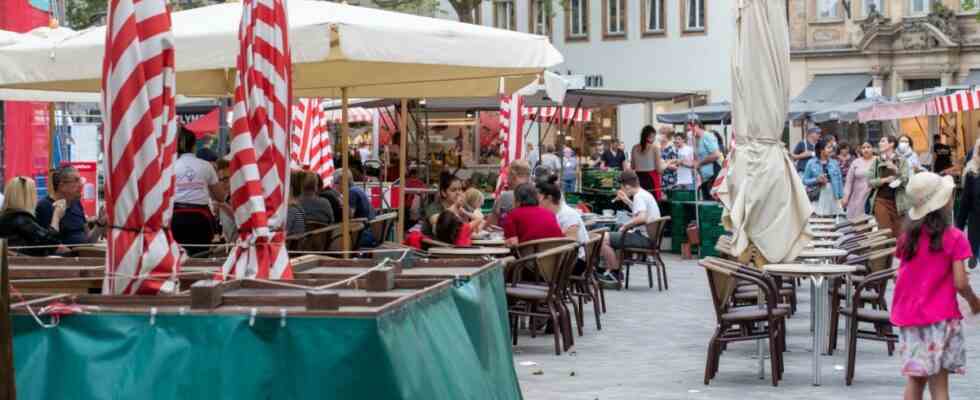Jürgen Wittmann is “totally happy”. This is not only because the owner of the day bar and Regensburg institution “Chin-Chin” is on vacation. It is much more because the city of Regensburg is now allowing him and other innkeepers to keep their outdoor areas. In other words, the tables and chairs that the landlords were allowed to set up in parking lots or on wide sidewalks during the Corona pandemic. And which have borne the name Schanigarten ever since – a term from Vienna which, by definition, means “outdoor areas on public land” and, popularly, small open-air terraces in front of coffee houses. What was then also intended as compensation for losses in the catering trade during the Corona pandemic turned out to be an enrichment for citizens and the cityscape in many places.
In the case of Jürgen Wittmann, it is about surfaces on the wall of the opposite Dreieinigkeitskirche. In 2021, the evangelical church and the innkeeper had successfully worked together to ensure that these areas were preserved. For the church, it meant less mess and trash after nights out because the waiters and waitresses could now keep an eye on it. For Wirt Wittmann it meant more sales. And the people of Regensburg also thought it was great because it visibly and noticeably improved the quality of life in the old town. “The whole city benefits from this,” says Wittmann.
And Regensburg is not alone in this pragmatic decision. Many cities in Bavaria are now permanently allowing larger outdoor areas – taking into account the protection of residents.
Bamberg is an example of this. There was initially resistance to the practice, which had become established on the Katzenberg in the old town during the pandemic. The city allowed the locals to have tables and chairs in parking lots – against the will of some Bambergers. At the end of last year, the city, restaurateurs, the Sand Citizens’ Association and the Sand interest group agreed on a compromise: Between May and October, the hosts are allowed to place chairs and tables in six parking spaces as usual. They only have to make way for the Sandkirchweih at the end of August and at flea markets.
In Rosenheim in Upper Bavaria, there is a certain affinity with the southern attitude to life, not only because of the Italian twin town of Lazise, and the additionally introduced sidewalk cafés are just right for the town and its residents. In autumn, the city council made the sidewalk café a permanent fixture – at the expense of a good handful of parking spaces and to be paid by the landlords, because the city charges between 7.50 and 15 euros per parking space and working day, depending on the location. For the city, that more than makes up for the lost parking fees. But the people in the town hall are also very satisfied with the new gastronomic freedoms, and at the tables in the sidewalk cafés anyway. There have also been isolated complaints from local residents. One of them is pending at the Munich Administrative Court, which has not yet dealt with it in detail.
Unlike in Rosenheim, the hosts in Nuremberg do not have to pay for the additional space. In this context, economics officer Michael Fraas (CSU) speaks of a “generous practice” that was developed in 2020 in exchange with the catering trade in order to at least open restaurants outside can. Restaurateurs will continue to have to pay fees for the outdoor areas that were already available before the pandemic, but will not have to pay fees for the additional ones made available by the city since 2020.
The city and gastronomy have benefited from the sidewalk cafés, it is said in Nuremberg
The city, says economics officer Fraas, attaches great importance to safety issues: ambulances, fire brigades and wheelchair users need free travel. The fact that what was initially intended as help during the Corona period is being continued is both at the request of the restaurateurs and in the interest of the city. “Gastronomy has benefited from this, but so has life in Nuremberg,” says Fraas. “We notice that people want to sit outside in the city center and enjoy the flair. That’s why we’re continuing that this year.”
In Augsburg, the city council made it clear shortly before Christmas that the expansion of outdoor areas, sidewalk cafés and, in some cases, longer opening times for restaurants in the immediate city center are still fundamentally desired. Originally started in the pandemic year 2020 as “Augsburg City Summer”, both the term and the associated measures have become established. The city hall coalition of CSU and Greens commissioned an evaluation of all summer activities in the city center in the summer: the experiences have been positive, and there have been largely no complaints from residents. In this respect, a “steady city summer package of measures” is now to be developed and the design guidelines for Augsburg’s city center revised. However, the evaluation suggests that the sidewalk cafés should be designed more attractively than last year: Some of the hospitality areas were not very attractive and looked more like wild growth.
The main beneficiaries of the decisions, apart from the fresh air-loving guests, are of course the operators of the gastronomy. “We think it’s very good that outdoor areas are being made available,” says Thomas Geppert, state chairman of the Bavarian Hotel and Restaurant Association (Dehoga). “On the one hand, this makes the cities more attractive and creates a special flair,” he explains. “And on the other hand, of course, it expands the possibilities for gastronomy.” The latter is necessary because: “Thank God we’re out of the pandemic, but we have a variety of other challenges,” explains the Dehoga country manager, referring to cost increases for food and energy. “So any space that is available is a great thing.”

